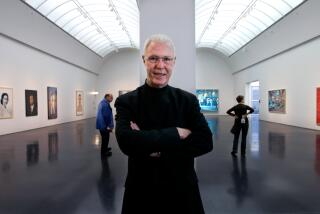Roger Ebert’s legacy lives on with the 20th edition of Ebertfest
- Share via
Roger Ebert succumbed to cancer in 2013, but the film festival that bears his name celebrates its 20th anniversary this week at the Virginia Theatre in Champaign, Ill.
“Ebertfest started off as a birthday party for HAL 9000, the computer from ‘2001: A Space Odyssey’; we had [author and co-screenwriter] Sir Arthur Clarke by satellite from Sri Lanka,” says Chaz Ebert, who married the critic in 1992. She’s CEO of RogerEbert.com, among other Ebert enterprises. “It was so much fun … Roger’s alma mater, the University of Illinois, asked if he would consider doing a one-time film festival.
“Roger went about finding movies he thought were gems, small movies that sometimes had not even had distribution yet. But my husband — once you do something one time and it’s a success, he said, ‘It’s a tradition!’ ”
Thus was born what was then the Overlooked Film Festival. Since Roger’s death, the festival has been curated by co-founder and producer Chaz and festival director Nate Kohn.
Columnist Richard Roeper says, “I don’t think I’ve ever met anyone with a greater love of movies, an appreciation of film, than Roger,” he says. “He was one of the reasons I wanted to write about film.”
Roeper and Roger Ebert were colleagues at the Chicago Sun-Times and co-hosts on the “At the Movies” TV show. Roeper says they saw thousands of movies together.
“One thing I loved about his writing was, even though he had an academic’s knowledge of film and could write for that type of crowd, his writing was so conversational. Brilliant and beautiful, but accessible. I think that’s what made him so popular.”
Roger Ebert and his first television partner, Gene Siskel, were among the first celebrity film critics, with the longest reach, thanks to their popular “Sneak Previews” and other programs. Ebert became the first film critic to win a Pulitzer Prize.
Chaz Ebert says her husband’s writing was special because “he had a deep and abiding empathy for human beings.” She notes that the ability of films to put a viewer “in someone else’s shoes, to feel like what it is to be a person of a different race or sexual orientation, or gender, or socioeconomic level, is the same kind of empathy he sincerely had to his core.
“If Roger hadn’t felt that so deeply, he probably wouldn’t have been around so long as a film critic – 46 years. He also wrote about politics. He wrote about social justice. He wrote about a lot of things, not just film.”
Ebertfest carries on the late critic’s worldview, as the co-founder and producer says, “This year, we’re having six films by female directors. That’s half … We’ve never done that.” Those titles include Ava DuVernay’s “13th” and Martha Coolidge’s “Rambling Rose.”
There will also be a 70 mm screening of “Interstellar” with a pair of astrophysicists handy to further blow viewers’ minds. Some films will screen around their 20th anniversaries – “Selena” (released in 1997) and the Coen brothers’ “The Big Lebowski” (1998).
“It’s the [25th] anniversary of ‘The Fugitive.’ [Director] Andy Davis is someone Roger admired because of all of his activities for social justice,” Chaz Ebert adds. “You know Roger loved the Coen brothers, ‘Fargo’ was one of his top 10 movies. Yet, it’s not the Coen brothers we’re having, but Jeff Dowd [a producer and activist who was a model for the film’s ‘Dude’ character] … He marched for civil rights and against the Vietnam War.”
It’s not just the festival keeping Ebert’s name alive, though.
“I don’t know anybody who’s a movie critic who wasn’t a huge fan of Roger’s,” says Roeper. “Look at his website; there are dozens of very fine writers who are carrying on his tradition, who were influenced by him. You can make all kinds of arguments about who was the greatest film critic of all time. But I don’t think there’s much of an argument about who’s not only one of the best, but clearly the most influential.
“Roger took such an interest in being a guiding force, doing things like the film festival and engaging with young critics. He was the exact opposite of the aloof legend in the corner; he was the life of the party at the screening room.
“To this day, people will come up to me, film critics or film fans, and they’ll tell me about the time they stopped him in an airport and talked for 15 minutes about movies.”
Charitable causes also benefit from the various Ebert enterprises, overseen by Chaz.
The Roger and Chaz Ebert Foundation, she says, empowers “women and families or helps with the education of children through the arts.” After his death, she started the Ebert Fellowship Program. Its founding principle was perhaps the one closest to her late husband’s heart: empathy.
“I added the principles kindness, forgiveness and compassion. I want emerging writers and film critics and technologies to incorporate those principles in their work.”
Still, she says, “ ‘Legacy’ is something that really didn’t mean much to Roger. He said, ‘When I’m gone, you can do whatever you want to do. Don’t worry about doing it for me. Do it as long as you’re having fun with it.’ ”
More to Read
Only good movies
Get the Indie Focus newsletter, Mark Olsen's weekly guide to the world of cinema.
You may occasionally receive promotional content from the Los Angeles Times.









